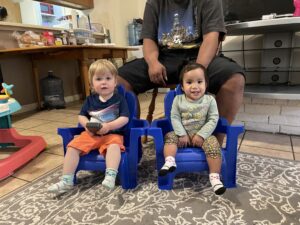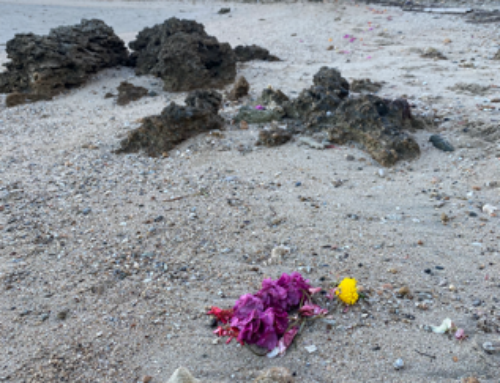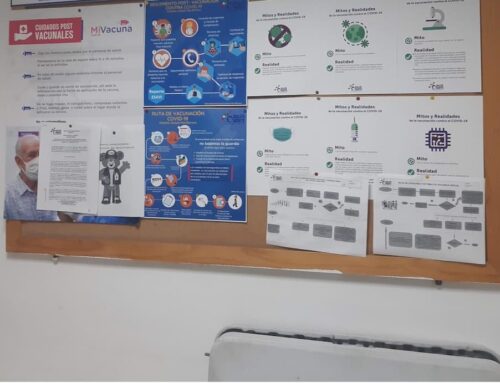
Kedem (Berman’s son) and Sylvia (Kati’s daughter), both one year old, sitting next to each other in two blue chairs. Photo by author.
No one wanted to babysit my child.
I was about to spend two months in Barnestown[1], a mid-sized, meatpacking town in the Central US with a large immigrant population, including a sizeable Marshallese community. Having formerly analyzed Marshallese children’s language and culture in the Republic of the Marshall Islands (RMI) (Berman 2019), I was now planning to investigate their experiences in US schools. As I had my one-year-old son in tow, I intended to leave him with a Marshallese family, who could watch him for pay. This way, my grant money would go back to the community, my son might learn some Marshallese, and if I found a family within the boundary of my focal school, I would gain another connection to the school. But my search for a babysitter did not go as planned.
One reason for my difficulty, I discovered, was fear of ri-pālle (Americans) and a related belief that ri-pālle children are “different” and “hard.” Interestingly, I encountered a similar but inverted fear and hesitation among educators in Barnestown schools, who expressed the view that “Marshallese children are challenging” and “different.” Such views of difference reflected my own hypothesis, based on existing research into culturally sustaining education: educational challenges reported by the Marshallese community stem partly from differences between Marshallese children’s communicative practices and those expected in schools (Berman, 2024).
Such views of difference, however, are challenged by this photo. Pictured is my son, Kedem, and Sylvia, the daughter of a recent Marshallese immigrant. Both one year old, the two children sit in identical blue chairs, smiling at the camera. This picture challenges widespread ideologies of difference, including those held by anthropologists like myself. Perhaps in our search for—and belief in—differences, we overlook such similarities.
***
I started my search with a local (non-Marshallese) colleague, who happened to be friends with a Marshallese woman whose children attended the relevant school. She turned out to be ‘too busy,’ however, as she was already caring for multiple children at home.[2]
I then turned to the Marshallese-run NGO I worked with. I asked my contacts to reach out to families, both from the school and elsewhere, to see if anyone wanted a babysitting job.
‘Any response?’ I asked.
‘Not yet.’
‘Now?’ I asked later.
‘I am so sorry,’ they told me, ‘I can’t find you a babysitter. Everyone “is busy.”’
One of my challenges was simply that there were not many people looking for work at that moment. This was 2022, when jobs were bountiful, wages high, and workers scarce. My difficulty, however, was not only the money. Many of the jobs held by members of the Marshallese community were factory jobs in poultry plants. From my perspective, while my nanny job did not pay as much as a factory job, it was a better, easier job, one in which people who were already staying home to watch their children could earn some money by also watching mine. But although poultry jobs are hard jobs, they are also familiar jobs. Ironically, they are psychologically safe jobs—albeit in an industry that is physically unsafe. My proposal, that people watch my child, was not safe or familiar. Marshallese do not regularly serve as nannies for ri-pālle families, and the people I was asking did not know me or my relationship to the Marshallese community.
So, I turned to people who did know me. Several members of my host family and their extended relations with whom I had lived in the RMI now lived in Barnestown. I had even paid the passport fee for one of them to help them migrate. They knew me, I figured, and would not be scared.
‘Could you, do it?’ I asked a long-time friend, Jackie.
‘Ah,’ she said, ‘ask Kati!’ Since Kati was older than Jackie, in some ways it made sense to tell me to ask her. Older people decide for youth. But, Kati told me, she was already working at the poultry factory. Jackie was not. I interpreted Jackie’s suggestion to ask Kati as an indirect “no” (Berman 2020). I then asked a male member of my extended host family. He was working, but he promised to find me a babysitter. After a week of silence, however, he got back to me. ‘I cannot find you a babysitter!’ Even people I had known for ten years would not do it.
Perhaps, if I had offered substantially more pay, I could have found someone. The poultry plants did pay more, I eventually learned, although I was searching for someone who was not currently working. But a larger obstacle, I believe, was the ideology of difference and fear of Americans. ‘They are scared of ri-pālle,’ a Marshallese friend explained to me several months later, after I recounted my struggles. She added, ‘they are scared of leo (the boy).’
What were they scared of? Although my friends knew me, they had never met my son—and I suspect that they may never have interacted with a ri-pālle child. Many recent Marshallese immigrants in Barnestown fear ri-pālle in general, and they also fear the law that they believe (not incorrectly) criminalizes common Marshallese childrearing practices such as spanking and co-sleeping. One woman told me she avoided taking her hurt child to the doctor out of fear that she would be blamed for his injuries. An average ri-pālle parent with sufficient money to hire a nanny, moreover, would probably have specific expectations about sleeping, eating, screen time, activities, and discipline—all expectations that can differ in Marshallese households.
So perhaps my friend was right when she told me that ‘American and Marshallese children are different’, “their ways are different.”
She continued, ‘American children are harder (rebin) than Marshallese children.’
‘How?’ I asked.
‘Marshallese children play with all of the toys,’ she told me. ‘They don’t care.’
‘What about Kedem?’ I asked. By this point in time, this friend had actually watched Kedem once (for pay), when I was in a bind. I had also brought Kedem over to their house multiple times, where he played with their toys and children and ate their food, resulting in laughter and astonishment that he ate the same things Marshallese children ate.
She smiled. ‘He preferred the toys you brought.’
‘I didn’t know how to take care of him,’ another friend told me several months in, as she apologized for not taking the babysitting job. ‘Marshallese kids are easy,’ she told me. ‘They don’t have a schedule; they sleep whenever they want.’
‘When does your child go to sleep [nap]?’ I asked.
‘Around ten,’ she said, mentioning a time quite close to when Kedem would also take a nap.
***
Were Kedem and Sylvia really so different? The specific ideas of difference above—the toys and the sleep—were not, in those cases, as different as people imagined. In the picture one could see differences of skin color and hair tone if one chose, although color difference is a matter of degree. There are many Marshallese with lighter and darker skin tones than Sylvia and many ri-pālle with lighter and darker skin tones than Kedem. With respect to toys, it is true that Kedem held a toy while Sylvia did not, but it was Sylvia’s toy. They had also both been fighting over the single blue chair in the room, which is what led to Sylvia’s dad grabbing the second one from a back room. Only one child in this picture was born in the US, and that was Sylvia. Kedem was born in Canada. Sylvia could one day be president, but Kedem cannot. Although my friend above said that Marshallese kids are “easy” because they don’t have a schedule and just sleep when they want, another friend complained to me about how her daughter did not sleep the night before and kept her up, a tale similar to those I hear from ri-pālle friends. In school, as well, Marshallese students are not as “different” as ideologies may assume (Berman, 2024). To take just one example, although educator ideologies of difference focus specifically on language difference, most Marshallese students who are born in the US speak English as well as—or better than—they speak Marshallese, and those born in the RMI also speak English, albeit a Marshallese variety (Berman, Roeder, and Tereshenko 2022).
The answer, of course, is that the two children were both different and similar, and a focus on either is an ideological choice. Anthropologists, however, often choose to focus on difference. Our project is to illuminate human differences, to make the strange familiar and the familiar strange. Anthropologists of childhood and education also often focus on differences: for example, discussing differences in childrearing strategies and language socialization practices to challenge hegemonic norms in medical and educational institutions. A focus on difference does reveal cultural particularities. In addition, Marshallese parents may have legitimate fears about ri-pālle parental expectations and the potential trouble that babysitting ri-pālle children might cause. Rhetorically, however, they construct that fear as tied to not differences between parents but those between children. In this, their rhetoric reflects that of their children’s educators, who also discursively overinterpret differences and erase similarities between children of varying ethnic groups. Such rhetorical constructions may have the inadvertent effect of leading to fear, misunderstanding, and avoidance.
***
Although my friends eventually watched Kedem once or twice, I never found a Marshallese babysitter. With only a couple of days left before my fieldwork started, I shifted my search. Ultimately, my money went to a ri-pālle college student who was home for the summer. Perhaps I hired someone who was more like me.
Notes
[1] Barnestown is a pseudonym.
[2] Dialogue in double quotation marks “” was recorded and transcribed, dialogue in single quotation marks ‘’ I wrote down in my fieldnotes.
Acknowledgements
Many thanks to the Marshallese families featured in this piece for their generosity, time, and effort. Many thanks to Vicki Collet, Rebecca Roeder, and the Marshallese Educational Initiative for their collaboration on the larger project. Thanks to Spencer Salas for his comments on a draft of this piece. This project was supported by the National Geographic Association and the University of North Carolina at Charlotte.
References
Berman, Elise. 2019. Talking Like Children: Language and the Production of Age in the Marshall Islands. Oxford Studies in the Anthropology of Language. New York: Oxford University Press.
Berman, Elise. 2020. “Avoiding Sharing: How People Help Each Other Get Out of Giving.” Current Anthropology 61 (2): 219–39.
Berman, Elise. 2024. “Different as Deficient: Challenging the Language of Difference in Constructions of Marshallese and Other Minoritized Students.” Linguistics and Education 80.
Berman, Elise, Rebecca Roeder, and Dmitry Tereshenko. 2022. “Neocolonial Englishes and Neocolonial Migration: Marshallese Language and Education in the Diaspora.” Micronesian Educator 33: 14–31.
Elise Berman is an Associate Professor of Anthropology at the University of North Carolina at Charlotte. She has written about Marshallese communities in the RMI and the U.S., language socialization, childhood, exchange, corporal discipline, child abuse, migration, and linguistic inequality. Her book Talking Like Children: Language and the Production of Age in the Marshall Islands was published by Oxford University Press in 2019. She is currently co-editing (with Benjamin Smith) a Handbook of Language Socialization in addition to researching changing language practices and racial identities in the U.S. South through a focus on the Marshallese immigrant community.
Cite as: Berman, Elise. 2024. “American Children are Hard”. In “Photographic Returns,” edited by Christina Kefala and Ipsita Day, American Ethnologist website, 23 June. [https://americanethnologist.org/online-content/collections/photographic-returns/american-children-are-hard-by-elise-berman/]
This piece was edited by American Ethnological Society Digital Content Editor Katie Kilroy-Marac (katie.kilroy.marac@utoronto.ca).





